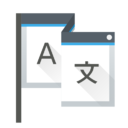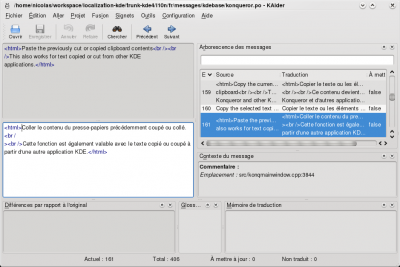Lokalize/fr: Difference between revisions
Updating to match new version of source page |
Fredtantini (talk | contribs) No edit summary |
||
| Line 2: | Line 2: | ||
{|class="tablecenter vertical-centered" | {|class="tablecenter vertical-centered" | ||
|[[Image:Lokalize.png|128px|left|Lokalize]]|| || | |[[Image:Lokalize.png|128px|left|Lokalize]]|| ||'''Lokalize est l'outil de traduction 'localisation' pour KDE et d’autres logiciels open source''' | ||
'''Lokalize est l'outil de traduction 'localisation' pour | |||
|} | |} | ||
'''Lokalize''' is also a general computer-aided translation system (CAT) with which you can translate OpenDocument files (*.odt). [https://translate-toolkit.readthedocs.org Translate-Toolkit] is used internally to extract text for translation from .odt to .xliff files and to merge translation back into .odt file. | |||
__TOC__ | __TOC__ | ||
| Line 17: | Line 13: | ||
==Lokalize under Windows and OS X== | |||
== Lokalize | |||
There are stripped-down Qt-only versions of '''Lokalize''' which are self-contained, i.e. they do not need KDE installed to run: | |||
:* [http://nekaka.com/d/xCuuVv7jlA win32] | |||
It lacks project management, spellcheck, scripting, and to translate OpenDocument you will need to install and run '''Translate-Toolkit''' yourself. If you have interest in '''Lokalize''' on non-free platforms, please let me know through reporting issues on bugs.kde.org. | |||
==Compiler Lokalize à partir de trunk== | ==Compiler Lokalize à partir de trunk== | ||
Install '''libkf5i18n-dev''', '''libkf5completion-dev''', '''libkf5itemviews-dev''', '''libkf5sonnet-dev''', '''kross-dev''' headers packages and '''libhunspell-dev'''. Then: | |||
{{Input|1= git clone <nowiki>git://anongit.kde.org/lokalize</nowiki>}}or | |||
{{Input|1= | |||
{{Input|1=git clone <nowiki>git@git.kde.org:lokalize</nowiki>}} | |||
{{Input|1= | and | ||
{{Input|1=cd lokalize | |||
{{Input|1=cd | |||
mkdir build | mkdir build | ||
cd build | cd build | ||
cmake | cmake -DCMAKE_BUILD_TYPE=RelWithDebInfo .. | ||
make -j2 | make -j2 | ||
src/lokalize | ./src/lokalize | ||
}} | }} | ||
== Trucs et astuces == | == Trucs et astuces == | ||
| Line 71: | Line 51: | ||
== Liens externes == | == Liens externes == | ||
:* [http://docs.kde.org/development/en/kdesdk/lokalize/index.html Handbook] | |||
: * [http://docs.kde.org/development/en/kdesdk/lokalize/index.html | :* [http://api.kde.org/4.14-api/kdesdk-apidocs/lokalize/html/annotated.html KDE SC 5 API Reference] | ||
: * [http://api.kde.org/4. | :* [https://bugs.kde.org/enter_bug.cgi?product=lokalize&format=guided Report a bug] | ||
[[Category:Développement/fr]] | [[Category:Développement/fr]] | ||
Revision as of 16:49, 7 May 2016
 |
Lokalize est l'outil de traduction 'localisation' pour KDE et d’autres logiciels open source |
Lokalize is also a general computer-aided translation system (CAT) with which you can translate OpenDocument files (*.odt). Translate-Toolkit is used internally to extract text for translation from .odt to .xliff files and to merge translation back into .odt file.

Lokalize under Windows and OS X
There are stripped-down Qt-only versions of Lokalize which are self-contained, i.e. they do not need KDE installed to run:
It lacks project management, spellcheck, scripting, and to translate OpenDocument you will need to install and run Translate-Toolkit yourself. If you have interest in Lokalize on non-free platforms, please let me know through reporting issues on bugs.kde.org.
Compiler Lokalize à partir de trunk
Install libkf5i18n-dev, libkf5completion-dev, libkf5itemviews-dev, libkf5sonnet-dev, kross-dev headers packages and libhunspell-dev. Then:
git clone git://anongit.kde.org/lokalize
or
git clone [email protected]:lokalize
and
cd lokalize
mkdir build
cd build
cmake -DCMAKE_BUILD_TYPE=RelWithDebInfo ..
make -j2
./src/lokalize
Trucs et astuces
Rechercher dans des fichiers
La TM (Mémoire de Traduction) conserve maintenant la provenance de chaque paire de traduction. Ainsi, lorsque vous une chaîne de caractères bien précise dans des fichiers sur le disque, il suffit de glisser le dossier contenant ces fichiers dans l'onglet (F7) pour mettre la TM à jour, patientez une ou deux minutes, puis tapez votre recherche dans le champ de droite de , puis appuyez sur Entrée.
Puis cliquez sur l'un des résultats et le fichier approprié s'ouvre, sur l'entrée concernée. Si vous voulez effectuer une autre recherche le même jour, tapez juste ce que vous cherchez. Vous pouvez filtrer les résultats de recherche de TM par nom de fichier en utilisant le champ à gauche du panneau F7 ().
Auteur
Nick Shaforostoff Page Facebook
